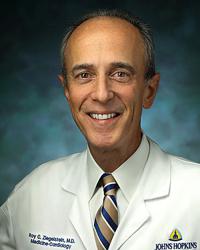Loading Complete

Roy Ziegelstein, MD
Cardiology
Accepting New Patients
31 Insurances Accepted
View allAbout
Professional Titles
Primary Academic Title
Background
Leadership Title
Research Interests
PubMed
Locations
- Johns Hopkins Bayview Medical Center
- 301 Mason Lord Drive, Suite 3300, Baltimore, MD 21224
- phone: 443-997-0270
- fax: 410-550-1137
Expertise
Education
Johns Hopkins University School of Medicine
Fellowship, Cardiology, 1993Johns Hopkins University School of Medicine
Residency, General Internal Medicine, 1989Boston Medical Center
Medical Education, MD, 1986Board Certifications
Internal Medicine
American Board of Internal Medicine, 2001Cardiovascular Disease
American Board of Internal Medicine, 1993Insurance
Johns Hopkins providers participate in many commercial health insurance plans. To confirm coverage of your specific physician or provider, please contact your insurer directly. For more details, please review our Insurance Information.
Search plans
- Aetna
- Amerigroup District of Columbia
- AmeriHealth Caritas District of Columbia
- Beech Street
- Blue Cross Blue Shield Federal Employee Program (FEP)
- CareFirst
- Cigna
- Evernorth Behavioral Health
- First Health
- Geisinger Health Plan
- HealthSmart/Accel
- Humana
- JAI Medical Systems
- Johns Hopkins Health Plans
- Kaiser Permanente
- KeyCare
- Maryland Physicians Care
- Medicaid Maryland
- Medicare Maryland
- MedStar Family Choice District of Columbia
- MultiPlan
- Pennsylvania's Preferred Health Networks (PPHN)
- Point Comfort Underwriters
- Private Healthcare Systems (PHCS)
- Provider Partners Advantage HMO SNP Medicare Advantage
- South Central Preferred (SCP)
- Superior Vision
- TRICARE (Humana Military East)
- UnitedHealthcare
- Veteran Affairs Community Care Network (Optum-VACCN)
- Wellpoint (Amerigroup MD)
